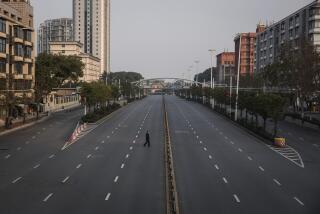No Chemicals on Chinese Vessel, State Dept. Says
- Share via
WASHINGTON — The State Department made the embarrassing acknowledgment Saturday that a highly publicized inspection of a Chinese merchant ship in the Persian Gulf turned up no evidence of any of the chemical weapons ingredients that U.S. officials had for weeks said the vessel was carrying.
The episode could prove to be a serious setback for American diplomatic efforts to stop the proliferation of dangerous technology. China and other countries may well seek to use the incident to challenge or ignore American allegations about secret transfers of materials for nuclear weapons, missiles or chemical and biological warfare.
Some experts also voiced concern that the incident may inhibit future U.S. intelligence efforts. “My own worry is that this will make everyone super-cautious, and become a setback for the (non-proliferation) policy rather than a manifestation of its strength,” former CIA Director Robert M. Gates told The Times.
U.S. officials had asserted that the 19,237-ton Chinese ship Yinhe was transporting two chemicals, thiodiglycol and thionyl chloride, that are key ingredients for the manufacture of poison gases. The United States maintained that these Chinese-made chemicals were bound for Iran.
The American assertions touched off an international incident. When China angrily denied the allegations, American planes and warships tracked the ship in and around the Persian Gulf. U.S. diplomats spent days trying to persuade several Gulf nations to let the ship dock for an inspection.
In the end, State Department spokesman Mike McCurry admitted in a written statement Saturday that an inspection of the ship’s 600 containers, led by Saudi Arabian officials in the Saudi port of Dammam, “revealed no evidence of these chemicals aboard that ship.”
“The inconvenience to the Yinhe and to the governments of Saudi Arabia and China is unfortunate,” McCurry said. “However, we believe the dangers of proliferation require us to pursue effective means of resolving concerns when credible evidence of destabilizing transfers exists.”
McCurry said the original information that the chemicals were aboard the ship came from “a number of credible sources,” but he did not identify them.
Privately, some officials said the U.S. intelligence community firmly believes its original information that the chemicals were on the ship was accurate--but that the chemicals were secretly unloaded or dumped from the ship in the weeks since it left China.
“We know it was on the front end, and after that who knows?” said one senior Clinton Administration official. “You can’t track a ship minute by minute. A lot of things could happen.”
But this official, who spoke only on condition that his name not be used, insisted that the failure of the inspection was less important than the signal that the United States intends to take a tough stance to combat the export of dangerous weapons.
“I don’t give a good goddamn whether it was on the ship or not,” he said. “That’s not the point. What counts is that people notice we’re going to act on this sort of thing.”
Gates voiced similar views. “If you want an aggressive non-proliferation strategy, you need to act when you have credible information,” he said.
“You’re not always going to be 100% successful when the policy moves from rhetoric to action. . . . But I think the message the Administration ought to put on this is that the United States is going to be very tough on non-proliferation issues.”
The Yinhe left China in mid-July. At first, U.S. officials avoided publicity and sought to quietly persuade Chinese officials to have the ship turn around and go home.
But in early August, China suddenly turned the incident into a public confrontation. The Chinese government accused the United States of “bullying” tactics and denied that the Yinhe was carrying the chemicals. The Chinese said that the ship, with a crew of 28, was loaded with paper products, metals and machine parts destined for Iran via the Persian Gulf port of Dubai.
In the written statement, McCurry did not apologize to China. He said, however, “We are grateful to the Saudi and Chinese governments for facilitating the inspection and helping to resolve questions over the ship’s cargo.
“We appreciate China’s cooperative and forthright assistance in resolving this matter and seek to work together to resolve other outstanding non-proliferation issues.”
More to Read
Sign up for Essential California
The most important California stories and recommendations in your inbox every morning.
You may occasionally receive promotional content from the Los Angeles Times.










